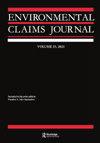A Study on Optimum Use of Fly Ash and GGBS in Fiber Cement Sheet to Enhance Sustainable Manufacturing
Q3 Environmental Science
引用次数: 0
Abstract
Abstract The biproducts of different industries must be reused or recycled which will avoid disposal of waste materials in the environment in different forms to protect our environment. Also the hazardous material used for the manufacturing of the products to be eliminated or minimized. In this paper a study has been conducted for optimum use of fly ash generated from power plants and Ground Granulated Blast Furnace Slag (GGBS) generated from steel plants in the manufacturing of fiber cemented roofing sheets. Also different percentages of fly ash, GGBS and pulp were added during the manufacturing of fiber cement roofing sheets in a fiber cement roofing sheet manufacturing plant and the quality of the final product has been tested subsequently in the laboratory to minimize the use of cement and asbestos fiber. Different results have been achieved in different percentages of fly ash, cement, GGBS, wood pulp and asbestos fiber combination. It is found that up to 36% addition of fly ash is acceptable with respect to the quality acceptance criteria of the final product, above 36% degrades the quality of the product which doesn’t meet the BIS: 459 standard requirements. Similarly, 10.38% of GGBS can be added without hampering the quality of the product. Finally, the best combination of raw mix design as per environmental sustainability point of view as well as the economic point of view has been suggested for the sustainable manufacturing of fiber cement roofing sheets.关于在纤维水泥板中优化使用粉煤灰和 GGBS 以增强可持续生产的研究
摘要 不同行业的副产品必须进行再利用或再循环,以避免以不同形式将废料丢弃在环境中,从而保护我们的环境。此外,还必须消除或尽量减少用于制造产品的有害物质。本文就发电厂产生的粉煤灰和钢铁厂产生的高炉矿渣(GGBS)在纤维水泥屋面板生产中的最佳利用进行了研究。此外,在一家纤维水泥屋面板生产厂生产纤维水泥屋面板时,还添加了不同比例的粉煤灰、GGBS 和纸浆,随后在实验室对最终产品的质量进行了测试,以尽量减少水泥和石棉纤维的使用。不同比例的粉煤灰、水泥、GGBS、木浆和石棉纤维组合产生了不同的结果。研究发现,就最终产品的质量验收标准而言,粉煤灰添加量不超过 36% 是可以接受的,超过 36% 则会降低产品的质量,不符合 BIS: 459 标准的要求。同样,添加 10.38% 的 GGBS 也不会影响产品质量。最后,从环境可持续发展的角度和经济角度出发,为纤维水泥屋顶板的可持续生产提出了原材料混合设计的最佳组合。
本文章由计算机程序翻译,如有差异,请以英文原文为准。
求助全文
约1分钟内获得全文
求助全文
来源期刊

Environmental Claims Journal
Environmental Science-Management, Monitoring, Policy and Law
CiteScore
2.20
自引率
0.00%
发文量
10
期刊介绍:
The Environmental Claims Journal is a quarterly journal that focuses on the many types of claims and liabilities that result from environmental exposures. The ECJ considers environmental claims under older business insurance policies, coverage and claims under more recent environmental insurance policies, as well as toxic tort claims. Exposures and claims from all environmental media are considered: air, drinking water, groundwater, soil, chemicals in commerce and naturally occurring chemicals. The journal also considers the laws, regulations, and case law that form the basis for claims. The journal would be of interest to environmental and insurance attorneys, insurance professionals, claims professionals, and environmental consultants.
 求助内容:
求助内容: 应助结果提醒方式:
应助结果提醒方式:


